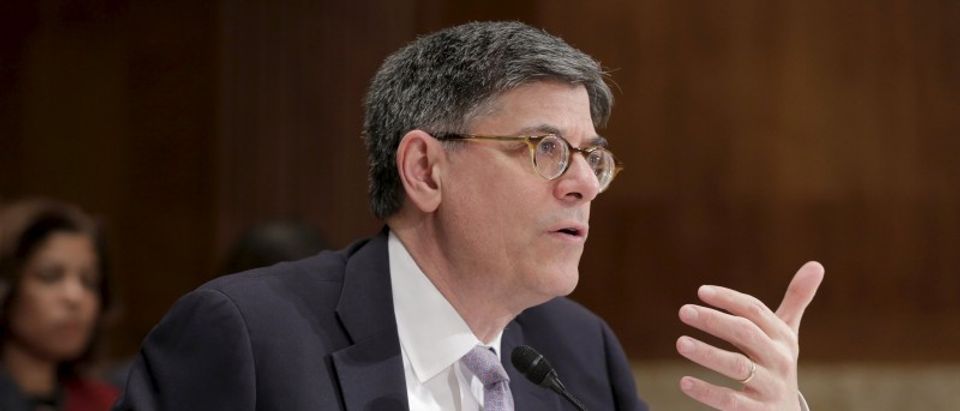This month, a coalition of free market supporters sent Treasury Secretary Jack Lew a letter urging him to meaningfully address tax inversions, in which companies merge with foreign counterparts and headquarter abroad, by working with Congress to pass corporate tax reform. The Treasury’s actions so far – three rounds of new tax inversion regulations over the past 19 months – won’t solve the problem.
In recent months, major American companies like Johnson Controls, Baxalta and Pfizer have announced plans to merge with foreign counterparts and relocate abroad, taking economic activity with them. More than a dozen have announced inversion plans over the past year and a half, a pace that will surely continue without tax reform.
The letter, of which my organization is a signer, stands in stark contrast to the fifty-five progressive activist groups that recently cosigned a letter to Secretary Lew pleading with him “to take prompt regulatory action that would prevent” tax inversions. Prompt action indeed. Days later, the Treasury introduced the most stringent regulations against tax inversions to date.
It’s unclear whether this letter from progressives impacted Secretary Lew’s decision. Given the lack of credibility of the cosigners, it is clear that it should not have. The cosigners are a mix of labor unions, labor union front groups, and activist groups largely funded by labor. None has credibility on the unique challenges facing American businesses, which are in a Darwinian struggle against global competitors that do not face the major competitive disadvantage of the U.S. corporate tax system.
The letter’s signees criticize companies for shifting operations abroad, but their blame is misdirected. The combined state and federal corporate income tax rate is a crushing 39.1 percent, the highest rate in the developed world. Ironically, the donor lists of the big government supporters who signed the letter are littered with companies that have also moved their operations overseas to protect their companies from the uncompetitive U.S. corporate tax system.
There is a desperate need to reform the backwards U.S. corporate tax system. Sadly, Congress has not passed significant comprehensive tax reform since the Tax Reform Act of 1986 under President Reagan. Mired in decades of gridlock, Congress should look to the states, not only for a plan, but for perspective.
As the nation’s leading free market association of state legislators, the American Legislative Exchange Council (ALEC) participates in the ongoing policy debate surrounding state tax reform. On the state level, taxation and spending are not abstract concepts impacting faraway constituents. Rather, they are felt acutely, and therefore state legislators are more likely to be held accountable by their constituents. That is why in 2015 alone, 17 states significantly cut taxes on net.
As the annual ALEC publication, Rich States, Poor States, consistently demonstrates, states are in constant competition with one another to attract population, businesses and commerce. As such, there is a natural economic pressure to control tax rates, lest people and companies “vote with their feet” and move to states that impose lower tax burdens. When an individual or corporation moves from a high-tax state to a low-tax state, it is widely understood to be a rational, incentive-based response. General Electric’s decision to move its corporate headquarters from Connecticut to Massachusetts will spare its employees some of the nation’s highest taxes. When Carl’s Jr. chose to move from California to Tennessee, it was because management merely fulfilled their fiduciary duty to operate the company with fiscal responsibility.
Why then, should it be surprising that the United States’ burdensome taxes inspire companies to leave?
To stop tax inversions and American companies shifting operations overseas, the U.S. corporate tax code must be brought in line with international norms. That means dramatically lowering the rate and applying it only to domestic production. This would bring production, good jobs, and the $2.1 trillion that American companies are holding overseas to avoid double taxation back home.
More regulations, on the other hand, would only bring about more of the same, pushing economic activity to more competitive regions abroad. The regulatory strongholds of New York, Illinois and California, which have seen a domestic outmigration of 3.4 million people over the last decade, show us that more regulations do not create economic growth.
Secretary Lew would be good to consider the revealed preferences of taxpayers rather than continue to take the advice of his liberal tax and spend friends. After all, no country has ever taxed its way to prosperity.
Lisa B. Nelson is the CEO of the American Legislative Exchange Council, the largest association of state legislators dedicated to limited government, free markets and federalism. Before joining ALEC, Nelson served as the Head of Government Relations, Americas for Visa, Inc.; Senior Vice President for External Relations, AOL Time Warner; Public Affairs Liaison to House Speaker Newt Gingrich; and as Executive Director of GOPAC. To learn more about ALEC, visit www.alec.org.


